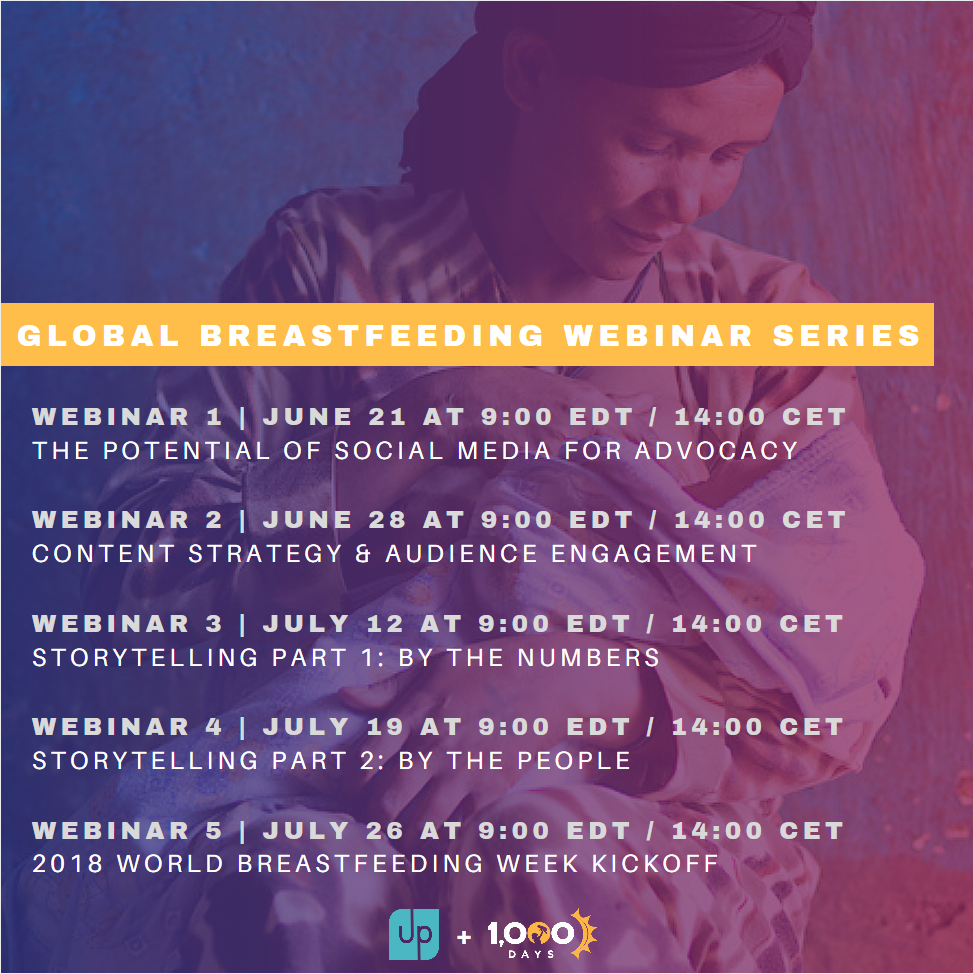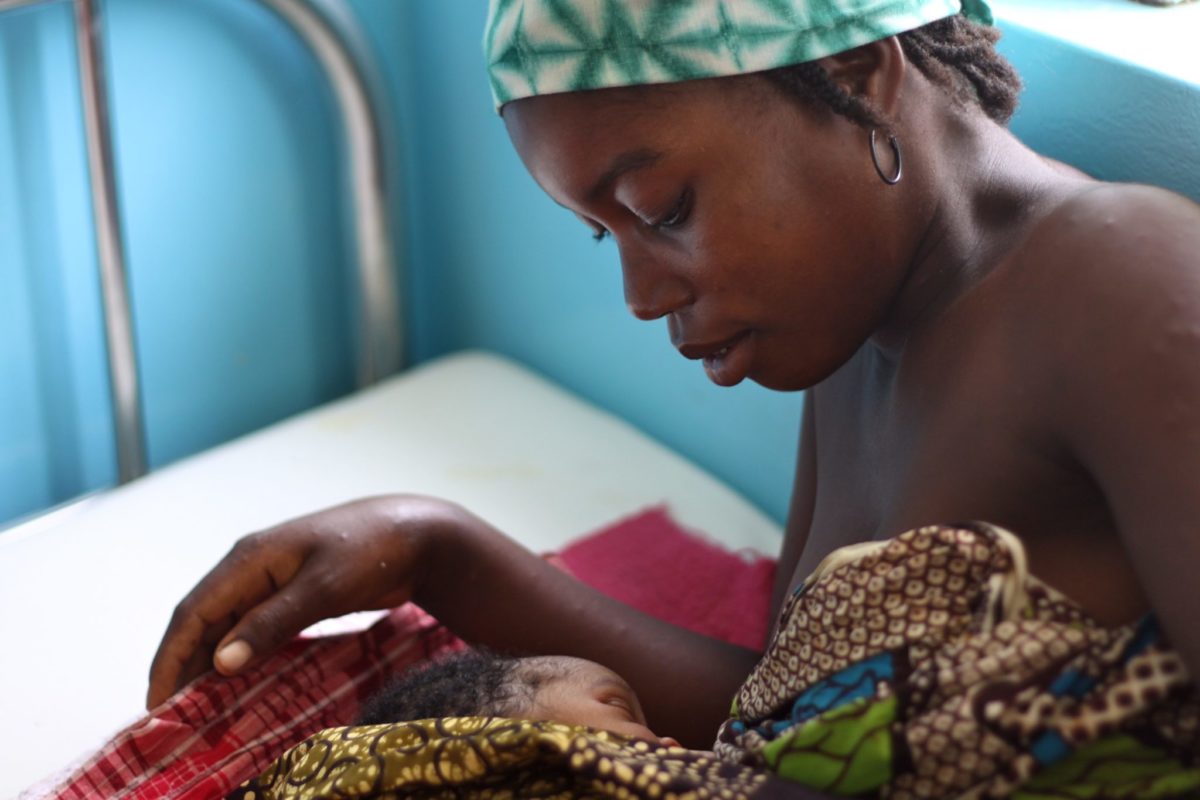Global Breastfeeding Webinar Series 2018: 1,000 Days & Upswell
We are proud to announce the Global Breastfeeding Webinar Series, where 1,000 Days and Upswell experts will offer free training to breastfeeding advocates around the world on how to utilize social media to promote, protect and support breastfeeding in the lead up to World Breastfeeding Week and National Breastfeeding Month (U.S.) in August.
Save your spot for this important series: https://bit.ly/2IWxMoz
*Aside from an opportunity to collaborate with your peers, participation in this series includes social media advertising credits.
WEBINAR DETAILS
Webinar 1 | The Potential of Social Media for Advocacy
June 21 at 9:00 EDT / 14:00 CET
The right tactics on Facebook can shatter stigma, spread lifesaving information, and more. On this webinar, we will explore real-world results from nonprofits around the globe. By the end of it you will have a sense of the giant opportunity to make World Breastfeeding Week and National Breastfeeding Month 2018 an unprecedented success.
Webinar 2 | Content Strategy & Audience Engagement on Facebook
June 28 at 9:00 EDT / 14:00 CET
Using lessons learned directly from organizations around the globe, this session will help you uncover strategies and tactics to engage more people on Facebook. We will also take an in-depth look at the qualities of the audience proven to spread credible messages about the benefits of breastfeeding.
Webinar 3 | Storytelling Part 1: By the Numbers
July 12 at 9:00 EDT / 14:00 CET
Compelling numbers are an important part of advocating for greater breastfeeding support – but only with the right packaging. By the end of this webinar, you will be able to use the powerful statistics about breastfeeding to make a convincing argument on social media.
Webinar 4 | Storytelling Part 2: By the People
July 19 at 9:00 EDT / 14:00 CET
Data moves minds, but stories move hearts. Storytelling has the power to make the world a healthier and more just place. This final webinar will show you how to tie everything together by collecting and sharing stories on social media
Webinar 5 | 2018 World Breastfeeding Week Kickoff
July 26 at 9:00 EDT / 14:00 CET
Let’s put everything that we learned together and into action this World Breastfeeding Week and National Breastfeeding Month. During this webinar, we will share tools- including a social media guide- to truly pump-up the volume on breastfeeding this World Breastfeeding Week and National Breastfeeding Month.
Please note: If you are a program manager, advocate or communicator who understands the need to boost the quantity and quality of content on breastfeeding, this webinar series is for you. Sign up for the Global Breastfeeding Webinar Series below.





 Human milk saves lives in the NICU and every day. Yet, millions of parents are still being undermined by the Breastfeeding Booby Traps®: prevented from achieving their breastfeeding goals, from accessing donor milk if needed, from obtaining non-industry sponsored, evidence-based information on alternative feeding methods, and from getting the non-judgmental acceptance and support they deserve from health professionals, family, friends, and society.
Human milk saves lives in the NICU and every day. Yet, millions of parents are still being undermined by the Breastfeeding Booby Traps®: prevented from achieving their breastfeeding goals, from accessing donor milk if needed, from obtaining non-industry sponsored, evidence-based information on alternative feeding methods, and from getting the non-judgmental acceptance and support they deserve from health professionals, family, friends, and society. “My first was born at 32 weeks because we had preeclampsia. I was heartbroken; I felt like my body had failed us. During her NICU stay, I felt so helpless, so angry, and so frustrated that I couldn’t give her what she needed to grow strong and healthy to term. Everything had gone wrong. But just a couple hours after she was born a lactation consultant came to see us to show me how to pump. She was so encouraging and was so impressed with the amount of colostrum I had expressed! Something had gone right, and that something was producing milk. She received just the smallest bit of donor milk, and from then on had my breastmilk for the duration of her hospital stay. Once we got home we worked so hard with a lactation consultant to get her to latch directly to breast. It took so much time, and energy, and tears, and support. It was on her due date that she finally did it! It was such a blessing to be able to nurse her directly. She grew and thrived and is now a 2-year old and the best big sister. I am so proud of her, and so thankful that breastfeeding helped me trust my body again.” – Lauren D
“My first was born at 32 weeks because we had preeclampsia. I was heartbroken; I felt like my body had failed us. During her NICU stay, I felt so helpless, so angry, and so frustrated that I couldn’t give her what she needed to grow strong and healthy to term. Everything had gone wrong. But just a couple hours after she was born a lactation consultant came to see us to show me how to pump. She was so encouraging and was so impressed with the amount of colostrum I had expressed! Something had gone right, and that something was producing milk. She received just the smallest bit of donor milk, and from then on had my breastmilk for the duration of her hospital stay. Once we got home we worked so hard with a lactation consultant to get her to latch directly to breast. It took so much time, and energy, and tears, and support. It was on her due date that she finally did it! It was such a blessing to be able to nurse her directly. She grew and thrived and is now a 2-year old and the best big sister. I am so proud of her, and so thankful that breastfeeding helped me trust my body again.” – Lauren D